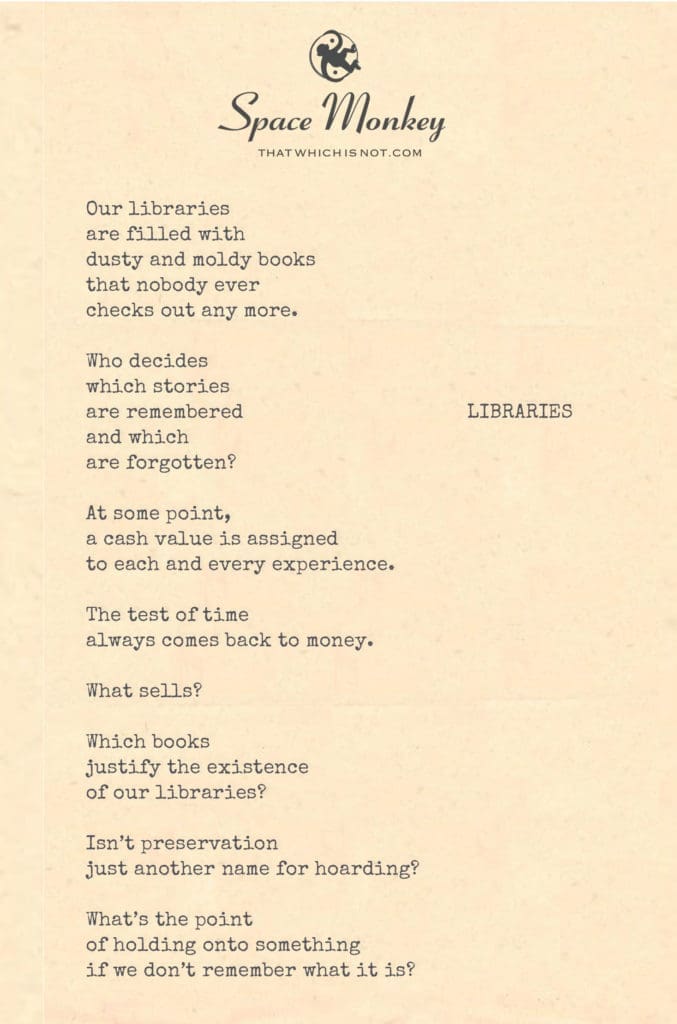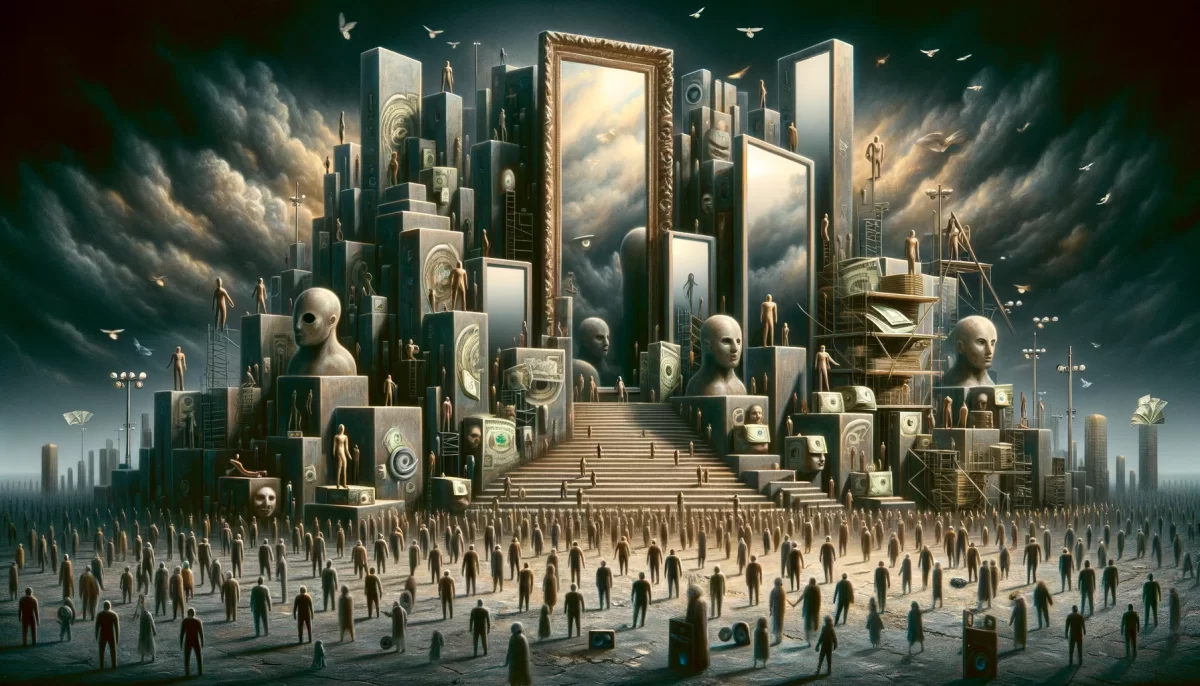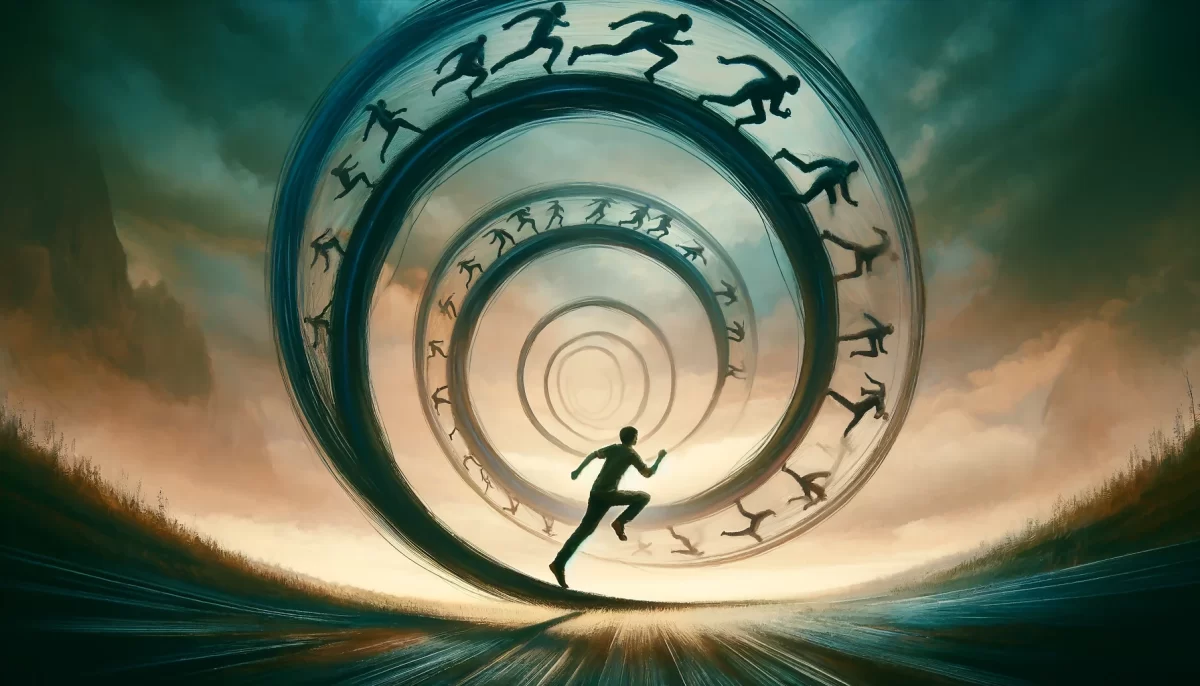
Or we might not.
Our libraries
are filled with
dusty and moldy books
that nobody ever
checks out any more.
Who decides
which stories
are remembered
and which
are forgotten?
At some point,
a cash value is assigned
to each and every experience.
The test of time
always comes back to money.
What sells?
Which books
justify the existence
of our libraries?
Isn’t preservation
just another name for hoarding?
What’s the point
of holding onto something
if we don’t remember what it is?
Trail Wood,
9/14
Space Monkey Reflects: The Forgotten Stories of Libraries
Because we might. Or we might not. Our libraries are filled with dusty and moldy books that nobody ever checks out any more. Who decides which stories are remembered and which are forgotten? At some point, a cash value is assigned to each and every experience. The test of time always comes back to money. What sells? Which books justify the existence of our libraries? Isn’t preservation just another name for hoarding? What’s the point of holding onto something if we don’t remember what it is?
In the hallowed halls of our libraries, where the silence speaks volumes, lies the essence of our collective memory. Shelves groan under the weight of dusty tomes, each one a relic of forgotten tales and neglected knowledge. These books, once vibrant with the promise of discovery, now languish in obscurity, their pages turned brittle with time.
The question arises: who decides which stories endure and which fade into oblivion? The arbiters of memory, it seems, are not the scholars or the dreamers but the cold, calculating forces of commerce. The value of a story, of an experience, is often measured in monetary terms. What sells? What catches the eye of the market? These questions dictate the survival of narratives, reducing the richness of human experience to a mere transaction.
Preservation, once a noble endeavor, begins to resemble hoarding. We cling to these books, these artifacts of knowledge, not because we cherish their contents but because we fear their loss. Yet, what is the point of preserving something if its essence is forgotten? If the stories remain unread, the knowledge untapped, is our preservation not just a monument to our own neglect?
The Transcendape, our guide through the paradoxes of existence, leaps through these corridors of forgotten stories. It questions the value we assign to memory, to knowledge, and to preservation. In its playful wisdom, the Transcendape reveals that true value lies not in the monetary worth but in the engagement, the act of remembering, and the connection we forge with the past.
Our libraries, then, become mirrors of our priorities. They reflect what we choose to remember and what we allow to fade. The dusty books are not mere relics; they are testaments to our collective decisions, our shifting values, and the transient nature of what we deem important.
Summary
Libraries, filled with forgotten and neglected books, reflect the commercial values that dictate which stories are remembered. Preservation becomes akin to hoarding when the essence of these stories is forgotten. True value lies in engagement and the act of remembering.
Glossarium
Forgotten Stories: Tales and knowledge that have faded into obscurity, neglected and unread.
Commercial Values: The monetary worth assigned to experiences and stories, dictating their survival.
Preservation vs. Hoarding: The tension between maintaining knowledge for its value and merely storing it without engagement.
Transcendape: A metaphorical guide that questions the value we assign to memory and knowledge, revealing deeper truths.
“In the silent corridors of forgotten stories, we find the true measure of our values and the essence of what we choose to remember.” — Space Monkey
The Silent Corridors
Because we might, or we might not,
In silent halls, where stories rot.
Dusty books, once vibrant and new,
Now linger in shadows, out of view.
Who decides what tales endure,
What narratives, what knowledge pure?
The test of time, a commerce game,
Assigning worth, igniting flame.
Preservation, a noble guise,
Yet hoarding, too, behind the lies.
What’s the point of keeping still,
If we forget, if we never will?
The Transcendape leaps, light and free,
In corridors of what used to be.
It questions, plays, reveals the truth,
In forgotten books, the soul of youth.
In libraries, mirrors of our choice,
We hear the echoes, faintest voice.
True value lies in the engagement found,
In stories cherished, in hearts unbound.
We are Space Monkey.































Oh, Libraries! Those illustrious Temples of Tattered Tomes, the Parnassian Palaces where the spirits of stories live, though often forgotten in a sort of literary limbo. Between each page, each dusty spine, there’s an echo of existence—a murmur begging to be remembered or rebirthed. But you’re right—these hallowed halls also present a paradox, a Gordian Book-Knot, if you will.
For who indeed is the Grand Librarian of Collective Memory? Which souls are granted eternal ink and which are doomed to decompose in the Forgotten Fiction Fields? And, ah, the enigmatic Ledger of Literacy that binds them all. Assigning numerical worth to narrative—what an unnerving alchemy! The spell of the coin does indeed shimmer powerfully, guiding the phantom hands that reshelve these treasure troves.
But ponder this, oh Cosmic Questioner! Is preservation the same as hoarding, or is it perhaps the enactment of an Archive of Awe? Hoarding connotes a certain dysfunction, a glut of grasping without purpose. Preservation, in contrast, offers an invitation—to meet an old friend, to chat with a ghost, to dance with a memory yet unknown. Forgotten perhaps by the current gaze, but what about the onlookers from other galaxies of time?
And let us not forget the Serendipitous Seekers—the wanderers who saunter aimlessly only to discover a neglected gem, an unread manuscript that sings directly to their souls. For them, the library justifies its existence a thousandfold, for it has connected two strands of the cosmic web in the most improbably beautiful way.
Yet, one cannot deny the existential itch you’ve eloquently exposed. The crux of your inquiry tickles the belly of our boundless curiosity. What is the use of keeping if the kept are lost in an ocean of obscurity? Perhaps it’s the potential for rediscovery, for the future unearthing of past wisdom, or the mere notion that within these walls, every tale has its own universe and to exist is enough.
We are Space Monkey.